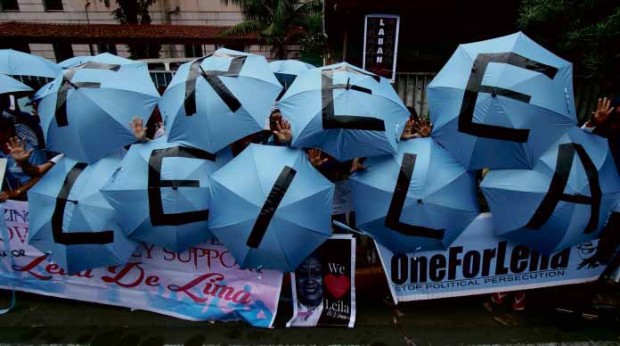
DE LIMA SUPPORT While oral arguments continued on Tuesday at the Supreme Court on Sen. Leila de Lima’s petition questioning her arrest on drug trafficking charges, her supporters outside the court once again demand her release. —RICHARD A. REYES
Justices of the Supreme Court on Tuesday hinted that detained Sen. Leila de Lima’s petition questioning her arrest might be headed for an outright dismissal due to violations of court procedures, including the principle of the hierarchy of courts.
At the continuation of the oral arguments on De Lima’s petition, several magistrates centered their questioning of the senator’s lead counsel, former Solicitor General Florin Hilbay, on technicalities concerning her petition for certiorari instead of discussing the main allegations against her by the Department of Justice (DOJ).
De Lima is accused of receiving protection payoffs from convicts running a multibillion-peso narcotics trade from New Bilibid Prison when she was the justice secretary.
She has denied wrongdoing and has maintained that the case against her should have been investigated by the Ombudsman and filed in the Sandiganbayan instead of criminal courts.
Associate Justice Presbitero Velasco Jr. raised the claim of Solicitor General Jose Calida that De Lima had falsified her “jurat,” or the phrase in her sworn affidavit stating the authenticity of her statements and the name of the lawyer who notarized the document.
Saying he was “bothered” by Calida’s allegation, Velasco asked Hilbay to explain how the senator could have signed and sworn to her affidavit before notary public Maria Cecile Tresvalles-Cabalo on Feb. 24 when records showed that Cabalo did not visit De Lima at her detention cell in Camp Crame on that day.
Hilbay agreed that the Rules of Court clearly required petitioners to attest to the veracity of their statements and that they should personally sign such documents.
“This could be a serious breach of Rule 65 (of the Rules of Court),” Velasco warned.
Section 1 of Rule 65 states that certiorari petitions should be “accompanied by a certified true copy of the judgment, order or resolution subject thereof … and a sworn certification of nonforum shopping.”
Forged affidavit
But Hilbay vehemently denied that De Lima had forged a portion of her affidavit, which was attested to by Cabalo.
Reading a statement issued by De Lima, he said the allegation of the Office of the Solicitor General (OSG) in its manifestation was “false” and had “no factual basis.”
“By repeatedly attempting to resort to the basest of technicalities and in lieu of substantial arguments … (the OSG) is scraping the bottom of the barrel for whatever argument is left to support her continued illegal detention,” Hilbay said.
De Lima, the most vocal critic of President Duterte’s bloody war on drugs, said the OSG’s strategy was “obviously born out of desperation.”
In her affidavit, Cabalo said she met with De Lima at the office of the Criminal Investigation and Detection Group in Camp Crame on the day she notarized the senator’s affidavit.
She said she tried to visit De Lima in her detention cell at the Philippine National Police Custodial Center, but was refused entry by the guards.
“Since I already know that Senator De Lima caused the preparation of the petition and that it was her who signed the same, I stamped and signed the (document),” Cabalo said.
Associate Justice Samuel Martires, who was appointed to the high court by President Duterte two weeks ago, asked Hilbay if Executive Judge Juanita Guerrero of Muntinlupa City Regional Trial Court (RTC) Branch 204 had to determine first her jurisdiction over the case before ordering De Lima’s arrest.
Martires, a former RTC judge and associate justice on the Sandiganbayan, pointed out that Rule 112 of the Revised Rules on Criminal Procedures, which pertains to the issuance of arrest warrants, came before Rule 117, which covers the motions to quash.
Question of jurisdiction
Hilbay said it was logical and was important for any RTC judge to rule first on the question of jurisdiction before issuing an arrest warrant against the accused.
To which Martires replied with sarcasm: “I would appreciate it if you would reduce that into writing and recommend to the Supreme Court the amendment of Rule 112 for the guidance of RTC judges.”
Associate Justice Diosdado Peralta said De Lima practically waived her right to due process when she refused to file a counteraffidavit during the preliminary investigation of the DOJ and a motion for reconsideration.
Peralta, also a former RTC judge and Sandiganbayan associate justice, said the senator should have also waited for Guerrero to rule on her motion to quash before she sought the high tribunal’s intervention.
But Hilbay said De Lima’s petition was “born out of frustration” after the DOJ acted with “undue haste” to resolve the drug cases against her and recommend her indictment despite the absence of strong evidence.
Senior Associate Justice Antonio Carpio then directed Hilbay to state “very good reasons” and “special and important reason” why De Lima directly brought her case to the high court instead of waiting for the resolution on her motion to quash in violation of the hierarchy of court.
In reply, Hilbay said: “We have made a very strong and clear case for an application of exceptions of the procedures of this court. These exceptions are clearly stated in the jurisprudence of this honorable court.”